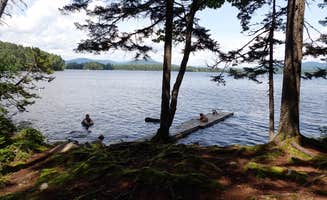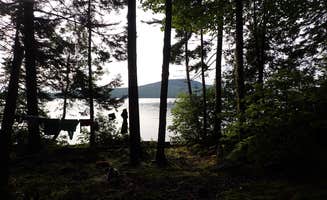Dispersed camping near Norton, Vermont centers primarily around waterfront sites along the Connecticut River and nearby lakes in Maine. The northeastern Vermont terrain features a mix of pine forests and riverside settings, with elevation changes creating some challenging access points. Most rustic camping opportunities are concentrated in these remote water-adjacent locations where summer temperatures average 70-80°F during peak camping season.
What to do
Fishing adventures: The Maine Railroad Trestle site offers excellent fishing from a rocky beach with easy water access. "There are several sites available here and a really nice rocky beach with easy access for loading and unloading. It's also a nice spot to fish from," reports Sarah C. about this Maine Railroad Trestle location.
Forest exploration: Campsites along the Forest Legacy Trail provide access to diverse Maine woodlands. When staying at Smudge Cove, visitors can "backpack in and enjoy some pretty cool Maine forests along the way," according to reviews. The trail system connects multiple remote sites for extended hiking opportunities.
Boating and paddling: Most dispersed sites near Norton require water transportation for access. Docking facilities vary by location, with some sites featuring proper docks while others demand more technical landings. At Smudge Cove, "there is a nice long dock that makes it super easy to boat into and unload," making it particularly accessible for paddlers with gear.
What campers like
Secluded environments: The remote nature of Norton area dispersed camping provides isolation from crowds. At Scott C. Devlin Memorial site, campers appreciate that it is "secluded and quiet" with the site "well maintained and tucked on a knoll in a pine forest," according to Sarah C.
Waterfront access: Direct water access ranks as a top feature across most sites, though quality varies significantly. Smudge Cove offers "relatively easy access to the water by way of the rocks, beside the dock," creating multiple entry points for swimming or boat launching.
Natural soundscape: The absence of developed facilities means minimal noise pollution. At Smudge Cove, campers report that "the only sounds you will hear at night are the loons," creating an authentic wilderness experience uncommon at more developed campgrounds.
What you should know
Weather vulnerability: Site conditions deteriorate rapidly during precipitation at many locations. At Eagle Cove, "it was tough to find a spot to pitch the tent that wasn't going to put us in a puddle" during rainy periods, requiring strategic tent placement to avoid collecting water.
Boat landing challenges: Water access points require careful navigation, especially with current. At Scott C. Devlin Memorial site, "there is a set of wooden steps that go down into the water at a relatively steep angle. Be sure you tie your boat up while unloading as there is a fair amount of current sweeping around the bend."
Variable site maintenance: Facility quality differs significantly between locations. While Maine Railroad Trestle and Scott C. Devlin Memorial sites receive regular maintenance, others like Raven show signs of overuse: "This site, while in a beautiful spot perched above Cupsuptic Lake, is so impacted that in the rain it was a literal mud pit."
Tips for camping with families
Site selection criteria: Choose sites with more established facilities for family comfort. Maine Railroad Trestle offers "a site perched high on the hill where there is a picnic table and fire ring" plus "a spot lower down that is nice and flat and probably better spots for tents," providing options for different family setups.
Wildlife precautions: Tick prevention becomes essential in certain areas. Multiple sites report tick presence, with Maine Railroad Trestle noting "the ticks in the field are insane! They weren't bad in the campsite but in the grass, they were epic," suggesting families should perform regular tick checks and avoid tall grass areas.
Space limitations: Some sites cannot accommodate multiple tents, limiting larger family groups. Raven campsite is described as "quite small and wouldn't be able to accommodate more than two small tents," making it unsuitable for larger family camping parties.
Tips from RVers
No direct vehicle access: The rustic camping opportunities near Norton primarily serve tent campers arriving by water or foot. None of the dispersed sites accommodate RVs directly, requiring RV owners to establish a base camp at developed campgrounds in neighboring communities and use these as launching points for day trips or overnight tent excursions to dispersed sites.





